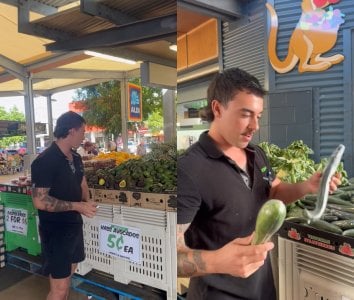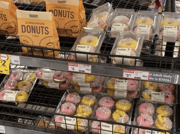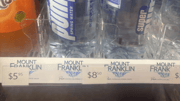Woolworths and Coles under fire with fruit and vegetable market’s 5-cent cucumbers and avocados
By
Seia Ibanez
- Replies 17
As the cost of living continues to rise, Australians are more vigilant than ever about finding the best deals, especially on their grocery bills.
It's no secret that supermarkets play a significant role in our weekly spending, but a recent revelation has left shoppers across the nation both shocked and outraged.
A Queensland fruit and vegetable market, Skippy’s Fresh Frootz, located in Victoria Point, southeast of Brisbane, has thrown a spotlight on the pricing policies of supermarket giants Woolworths and Coles.
Known for its incredibly cheap weekly specials, Skippy’s latest offer of Hass avocados and large continental cucumbers for just 5 cents each has sent bargain hunters in a spin.

The price difference is staggering when compared to the major supermarkets. Coles currently has avocados priced at $1.50 and cucumbers for sale at $3—a 2900 per cent and 5900 per cent markup on Skippy’s prices, respectively.
Woolworths isn't far behind, with avocados for sale for $1.20 and cucumbers available for $2.50, marking up 2300 per cent and 4900 per cent more than Skippy’s 5-cent offerings.
Elijah from Skippy’s Fresh Frootz explained that they are selling the avocados and cucumbers at cost—the same price they're buying them from suppliers for.
He acknowledged that it's unrealistic for Woolworths and Coles to match these prices, but he believes their mark-ups 'don't have to be so drastic’.
'We're not losing on these lines when we are selling at these prices, but we're not making any money on them,' he said.
'We sell them at cost price. The way that we work—and the way that supermarkets could work as well—is they make enough margin on a lot of other things.'
‘But when they can, when certain things are in season, they can sell stuff and have one or two lines that they don’t make a profit on. I mean, they’re making that money elsewhere.’
‘When we can sell something for five cents, [Woolworths and Coles] are still getting it cheaper than us because they have buying power,’ he added.
‘And if we can sell at a price sensitive cost price, and they’re selling under $3, and the mark-up on that is insane. I mean, you times that by how many stores they have Australia-wide.’
This comes after an economist and journalist wrote about the Aussie growers’ battle against Coles and Woolworths amid the senate inquiry into supermarket pricing.
Fruit growers exposed that supermarkets make the most profit on green apples, claiming that they cost double what the supermarkets buy them.
A Coles spokesperson defended its pricing policies, citing the importance of its relationships with Australian farmers and the influence of market pricing, seasonal weather conditions, and supply and demand.
‘The price of fresh fruit and vegetables is determined by market pricing which varies throughout the year due to seasonal weather conditions, as well as supply and demand. We work closely with our growers to ensure a fair and comparable market price is provided to them, which, in turn, we can sell to our customers,’ the spokesperson said.
‘We are always looking for ways to provide great value to customers, which is often through produce that is in seasonal abundance. This also supports our growers who may have ample supply.’
Woolworths' pricing strategy is said to reflect current market conditions, given that cucumbers and avocados are not in peak season.
However, Elijah believed that one key factor was driving up consumer costs.
‘It’s how much fruit and vegetables [Coles and Woolworths] reject, and what they reject gets put into landfill, and that drives the price up on everything else because they pick the perfect stuff,’ he said.
‘And their standards of perfect are 100 per cent perfect.’
Shopping at smaller, independent retailers like Skippy’s can lead to significant savings, according to Elijah.
‘You walk out of there smiling, which isn’t something that a lot of shoppers have these days as well,’ he said.
‘Like obviously there’s stuff where the price is what it is. You can’t you can’t help that. And you know, there’s even times where we can be higher than what the supermarkets are, simply because they have the buying power.’
‘But you’ll get a full trolley of food for $120 at Skippy’s. You won’t see that at Woolies and Coles,’ he added.
With a loyal customer base built up through weekly specials advertised on social media platforms, Skippy’s Fresh Frootz is challenging the status quo and encouraging shoppers to reconsider where they spend their grocery dollars.
‘In the ads that I do, I kind of stick it to the supermarkets a little bit,’ he shared.
‘I’m careful with not calling them out individually. But that’s what the people are responding to right now because they’re fed up with it as well.’
‘People would complain like, you know, groceries are so expensive now. But unless you put it in their face and go, well, it doesn’t have to be like that, then they won’t change.’
You can watch one of Elijah’s videos below:
Credit: Skippy’s Fresh Frootz / Facebook
 What are your thoughts on major supermarkets' pricing strategies? Have you found better deals at local markets or independent grocers? Share your experiences and tips in the comments below!
What are your thoughts on major supermarkets' pricing strategies? Have you found better deals at local markets or independent grocers? Share your experiences and tips in the comments below!
It's no secret that supermarkets play a significant role in our weekly spending, but a recent revelation has left shoppers across the nation both shocked and outraged.
A Queensland fruit and vegetable market, Skippy’s Fresh Frootz, located in Victoria Point, southeast of Brisbane, has thrown a spotlight on the pricing policies of supermarket giants Woolworths and Coles.
Known for its incredibly cheap weekly specials, Skippy’s latest offer of Hass avocados and large continental cucumbers for just 5 cents each has sent bargain hunters in a spin.

Elijah of Skippy’s Fresh Frootz shared the cheap weekly specials on social media. Credit: Skippy’s Fresh Frootz / Facebook
The price difference is staggering when compared to the major supermarkets. Coles currently has avocados priced at $1.50 and cucumbers for sale at $3—a 2900 per cent and 5900 per cent markup on Skippy’s prices, respectively.
Woolworths isn't far behind, with avocados for sale for $1.20 and cucumbers available for $2.50, marking up 2300 per cent and 4900 per cent more than Skippy’s 5-cent offerings.
Elijah from Skippy’s Fresh Frootz explained that they are selling the avocados and cucumbers at cost—the same price they're buying them from suppliers for.
He acknowledged that it's unrealistic for Woolworths and Coles to match these prices, but he believes their mark-ups 'don't have to be so drastic’.
'We're not losing on these lines when we are selling at these prices, but we're not making any money on them,' he said.
'We sell them at cost price. The way that we work—and the way that supermarkets could work as well—is they make enough margin on a lot of other things.'
‘But when they can, when certain things are in season, they can sell stuff and have one or two lines that they don’t make a profit on. I mean, they’re making that money elsewhere.’
‘When we can sell something for five cents, [Woolworths and Coles] are still getting it cheaper than us because they have buying power,’ he added.
‘And if we can sell at a price sensitive cost price, and they’re selling under $3, and the mark-up on that is insane. I mean, you times that by how many stores they have Australia-wide.’
This comes after an economist and journalist wrote about the Aussie growers’ battle against Coles and Woolworths amid the senate inquiry into supermarket pricing.
Fruit growers exposed that supermarkets make the most profit on green apples, claiming that they cost double what the supermarkets buy them.
A Coles spokesperson defended its pricing policies, citing the importance of its relationships with Australian farmers and the influence of market pricing, seasonal weather conditions, and supply and demand.
‘The price of fresh fruit and vegetables is determined by market pricing which varies throughout the year due to seasonal weather conditions, as well as supply and demand. We work closely with our growers to ensure a fair and comparable market price is provided to them, which, in turn, we can sell to our customers,’ the spokesperson said.
‘We are always looking for ways to provide great value to customers, which is often through produce that is in seasonal abundance. This also supports our growers who may have ample supply.’
Woolworths' pricing strategy is said to reflect current market conditions, given that cucumbers and avocados are not in peak season.
However, Elijah believed that one key factor was driving up consumer costs.
‘It’s how much fruit and vegetables [Coles and Woolworths] reject, and what they reject gets put into landfill, and that drives the price up on everything else because they pick the perfect stuff,’ he said.
‘And their standards of perfect are 100 per cent perfect.’
Shopping at smaller, independent retailers like Skippy’s can lead to significant savings, according to Elijah.
‘You walk out of there smiling, which isn’t something that a lot of shoppers have these days as well,’ he said.
‘Like obviously there’s stuff where the price is what it is. You can’t you can’t help that. And you know, there’s even times where we can be higher than what the supermarkets are, simply because they have the buying power.’
‘But you’ll get a full trolley of food for $120 at Skippy’s. You won’t see that at Woolies and Coles,’ he added.
With a loyal customer base built up through weekly specials advertised on social media platforms, Skippy’s Fresh Frootz is challenging the status quo and encouraging shoppers to reconsider where they spend their grocery dollars.
‘In the ads that I do, I kind of stick it to the supermarkets a little bit,’ he shared.
‘I’m careful with not calling them out individually. But that’s what the people are responding to right now because they’re fed up with it as well.’
‘People would complain like, you know, groceries are so expensive now. But unless you put it in their face and go, well, it doesn’t have to be like that, then they won’t change.’
You can watch one of Elijah’s videos below:
Credit: Skippy’s Fresh Frootz / Facebook
Key Takeaways
- Skippy's Fresh Frootz, a Queensland fruit and vegetable market, advertised avocados and cucumbers for 5 cents each, a stark contrast to Coles and Woolworths' prices.
- Elijah from Skippy’s Fresh Frootz suggests that supermarkets' markups on these items don't need to be so high, as they make sufficient profit from other products.
- Coles and Woolworths defend their pricing strategies, explaining that prices are influenced by market conditions, seasonal availability, and ensuring fair trade with farmers.
- Elijah advocates for shopping with independent retailers to save money and illustrates how packaging may mislead customers about product weights and quantities.







